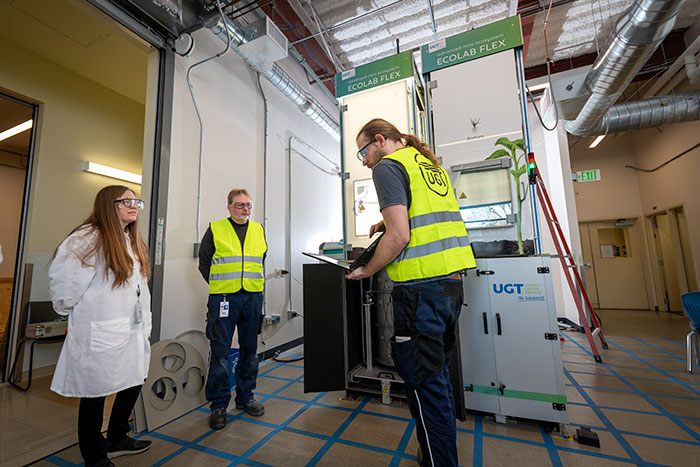The secrets to improving carbon sequestration capabilities could be hiding in the microscopic world beneath the soil’s surface. That’s why UC Davis faculty members Jorge Mazza Rodrigues and Amélie Gaudin are collaborating with Kateryna Zhalnina, a research scientist from Berkeley Lab’s Environmental Genomics and Systems Biology Division. The team will study plant-microbe interactions in cover-crop plants and how they might facilitate decarbonization. Each researcher brings expertise at a distinct scale: Gaudin supports farmers with large field operations; Rodrigues is focused on soil; and Zhalnina works at the molecular level. The team anticipates that their research interests, along with the advanced technologies and facilities available at each institution, will synergize to build a more comprehensive understanding how plant-soil-microbe interactions could affect or respond to different climate scenarios. Ultimately, their advances could help identify cover crop options that are both good for crop productivity and help remove excess carbon from the atmosphere.
Along with crop fields, forests are another major player in agricultural carbon dioxide removal. UC Davis assistant professor Laura Bogar and Berkeley Lab scientist Eoin Brodie, who has a primary appointment in the Earth and Environmental Sciences Area and a secondary appointment in the Biosciences Area, have been awarded funds to investigate the movement of carbon from trees to the soil. Bogar will combine her extensive experience studying the beneficial associations between fungi and plant roots with Brodie’s expertise in simulating ecosystems to more accurately predict tree-fungi interactions and their effect on carbon sequestration. The combination will allow them to gain a clearer sense of how these fungi-plant relationships, called mycorrhizae, might improve decarbonation as the climate changes.
As the changing climate renders vast swaths of agricultural land unusable, crop production will increasingly rely on controlled-environment facilities, such as greenhouses. These facilities consume significant energy, which typically comes from fossil fuels. To help reduce their environmental impact, Md Shamim Ahamed, UC Davis assistant professor, and Yi Liu, Facility Director of Organic and Macromolecular Synthesis at Berkeley Lab’s Molecular Foundry, are testing innovative ways to incorporate solar panels into the greenhouse setting. Their research focuses on harnessing excess light energy that accumulates in greenhouses through photo-selective solar cells, reducing energy consumption and improving efficiency.
Beyond working towards the broader goal of agricultural decarbonization, all three teams will help train the next generation of scientists. The UC Davis-Berkeley Lab collaboration will offer research experiences for graduate and undergraduate students in microbiology and soil science in labs at both campuses, forest ecology at the Blodgett Forest Research Station in the Sierra Nevadas, and nanoscience materials engineering at the Molecular Foundry.
Read more on the UC Davis News Page.




